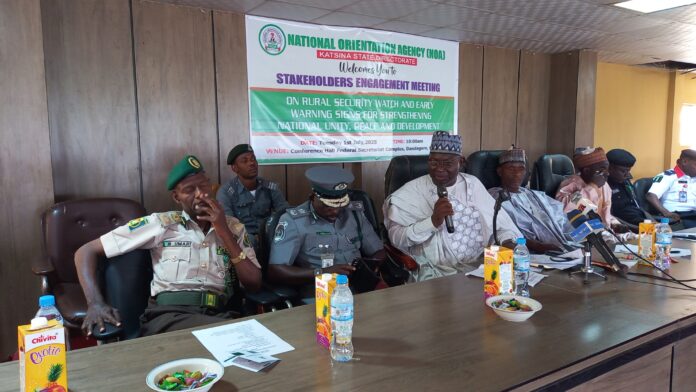By Abdullahi Inuwa
In a bold move to address rising insecurity across rural communities, the National Orientation Agency (NOA), Katsina State Directorate, on Monday held a high-level Stakeholders Meeting on Rural Security Watch at the Federal Secretariat Complex, Dandagoro, Katsina.
The meeting, which drew participants from security agencies, traditional rulers, community leaders, academics, and government officials, was part of the nationwide implementation of the National Action Plan for Peace Building Between Herders and Communities in Nigeria.
Welcoming participants, the State Director of NOA, Malam Muntari Lawal Tsagem, emphasized the urgency of the dialogue, highlighting the escalating threats to peace and national unity arising from conflicts between herders and farmers — a crisis now affecting nearly every corner of the country.
“Distinguished participants, our country is grappling with a cocktail of security challenges — insurgency in the Northeast, secessionist agitations in the Southeast and South-South, youth restiveness in the Southwest, and banditry and kidnapping in the North. But the herders-farmers clashes have cut across regions, disrupting lives and our national fabric,” Tsagem said.
According to him, Katsina, once known for its serenity and agricultural productivity, has suffered greatly due to the spread of armed banditry, kidnapping, and cattle rustling. He stressed that without confronting the root causes, any temporary victory would be short-lived.
“It is not enough to chase away the criminals. We must understand and solve the underlying problems to prevent these crises from resurfacing.”
He commended Governor Dikko Umar Radda for what he described as “unprecedented efforts” in restoring peace to Katsina State, citing recent peaceful agreements between herders and farmers in some local government areas.
“But the real question is — how do we sustain these peace deals? How do we bring healing to the victims who have lost loved ones and livelihoods?” he asked.
He also called on the Katsina State Government to recognize and support ongoing grassroots peacebuilding efforts across vulnerable communities.
The event featured a key presentation by Dr. Sama’ila Balarabe, who delivered a paper titled “Causes of Insecurity in Rural Areas.” He identified poverty, illiteracy, youth unemployment, land disputes, climate change, religious and cultural manipulation, corruption, and the proliferation of small arms as the driving forces behind rural insecurity.
Dr. Balarabe proposed a multi-pronged solution:
- Boosting agricultural productivity
- Entrepreneurship and skill acquisition programmes for youth
- Responsible governance and resource management
- Controlling the movement of arms and ammunition
Also speaking at the forum was the Comptroller of the Nigerian Customs Service, Katsina State Command, Abba Aji, who stressed that security is a shared responsibility.
“We need more than military might. We need to build a society grounded in values. This starts from the family unit and spreads across schools, places of worship, and the media,” he said.
Comptroller Aji emphasized the role of value orientation and civic education as essential tools in shaping responsible citizens and discouraging criminal tendencies.
The stakeholders unanimously agreed that lasting peace must be community-driven and rooted in justice, dialogue, and inclusion. Several participants called for the integration of traditional institutions and local vigilante networks in intelligence gathering and conflict resolution.
As the meeting drew to a close, Malam Tsagem assured that the ideas and suggestions from the forum would feed into the broader national peacebuilding strategy.
“We are not here to make speeches; we are here to make progress. Your voices today will shape policies tomorrow,” he concluded.
The meeting comes at a critical time when rural communities across Katsina and Nigeria at large continue to bear the brunt of a complex security crisis. NOA’s initiative, backed by the Federal Government’s Action Plan, is seen as a step in the right direction toward national reconciliation and sustainable rural peace.




